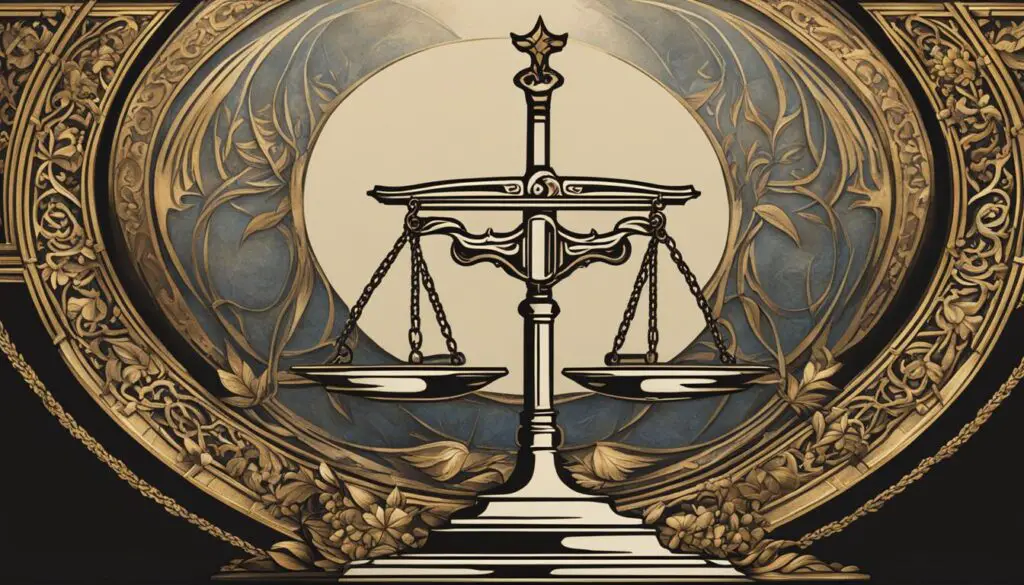The concept of justice in the Bible is often misunderstood and debated. Understanding the biblical definition of justice is important as it guides moral conduct and compassion in our modern world.
In this article, we will explore the different aspects of justice according to the Bible, including its meaning, etymology, and its relevance in today’s world. We will also examine what scholars say about justice in the Bible and explore various Bible stories that highlight the importance of justice. Finally, we will discuss how justice is viewed differently by different individuals in today’s society.
Let’s dive deep into the rich and multifaceted understanding of justice in the Bible, and discover its significance for our lives today.
Key Takeaways:
- The Bible provides a unique and comprehensive perspective on justice
- Understanding the biblical definition of justice helps guide moral conduct
- Justice in the Bible is grounded in God’s laws and standards of righteousness
- Bible stories illustrate the importance of justice in various contexts
- Different individuals have different perspectives on justice in today’s society
What is Justice?
Justice, according to the Bible, is the concept of people getting what they deserve, whether it is good or bad. It is not just about equality or fairness, but about receiving appropriate consequences based on one’s actions. The biblical definition of justice goes beyond personal opinions and subjective interpretations. It is grounded in God’s laws and standards of righteousness. Understanding this definition helps to clarify the role of justice in the Bible and its significance in shaping moral conduct.
Justice in the biblical context is not arbitrary or based on human standards. It is rooted in God’s nature and character of righteousness. As Proverbs 21:15 states, “When justice is done, it brings joy to the righteous but terror to evildoers.” This indicates that justice serves as a means of reward and punishment, ensuring that righteousness is upheld and wrongdoing is addressed.
Furthermore, understanding justice in the Bible requires recognizing its connection to the concept of sin. The Apostle Paul writes in Romans 3:23, “For all have sinned and fall short of the glory of God.” This verse highlights the universal nature of sin and the need for justice to address the consequences of wrongdoing. It emphasizes that justice is not just about punishment, but also about restoration and reconciliation.
The Etymology of Justice
The word “justice” has a rich and fascinating etymology that traces back to different languages and cultures. Understanding the origins of the word helps us gain deeper insights into its meaning and significance in the context of the Bible. In Latin, the term “iustitia” forms the basis of the word justice, which translates to righteousness or justice. This emphasizes that justice is closely tied to the concept of moral conduct and living in alignment with divine laws.
In the Hebrew language, the word for justice is “mishpat,” which denotes the act of judging, making decisions, and the overall concept of justice itself. It carries a sense of righteousness, fairness, and the execution of impartial judgments. This shows that justice, in the Bible, is not merely a human-made concept but is rooted in divine principles and the pursuit of righteousness.
In Greek, justice is represented by the word “dikaiosunē,” which encompasses notions of righteousness, integrity, and moral equity. It reflects a sense of upholding what is right and just, both in personal actions and societal interactions. The Greek understanding of justice aligns with the biblical perspective, emphasizing the importance of living in accordance with God’s standards of righteousness.

“The word ‘justice’ is derived from the Latin term ‘iustitia,’ meaning righteousness or justice. In Hebrew, ‘mishpat’ signifies both the act of judging and the concept of justice. The Greek word for justice is ‘dikaiosunē,’ which is closely tied to righteousness and integrity. Understanding the etymology of justice sheds light on its significance and helps us grasp its true meaning in the Bible.”
Justice in Hebrew Scriptures
The Hebrew Scriptures, also known as the Old Testament, provide a rich foundation for understanding the concept of justice. Throughout the Torah, justice is portrayed as one of God’s essential attributes. It is emphasized that God is a just judge who upholds righteousness and punishes wrongdoing.
“He is the Rock, his works are perfect, and all his ways are just. A faithful God who does no wrong, upright and just is he.” (Deuteronomy 32:4)
The Torah contains numerous laws and regulations that outline how justice should be carried out in society. These laws cover various aspects of life, including personal conduct, societal relationships, and the redistribution of resources. The emphasis on justice in the Torah highlights its importance in maintaining a just and equitable society.
The Role of Justice in the Torah
Justice in the Torah is not limited to legal proceedings but extends to every facet of life. It encompasses fair treatment for all individuals, regardless of their social status or background. The Torah repeatedly emphasizes the importance of treating the vulnerable and marginalized with justice and compassion.
“Do not pervert justice; do not show partiality to the poor or favoritism to the great, but judge your neighbor fairly.” (Leviticus 19:15)
This verse not only emphasizes the need for impartiality in judgment but also underscores the responsibility to ensure justice is not biased based on social standing. The Torah promotes a vision of justice that is rooted in equality, righteousness, and mercy.
Table: Examples of Justice in the Torah
| Story | Key Lesson |
|---|---|
| The Story of Adam and Eve | Justice through consequences: Adam and Eve face the consequences of their disobedience, highlighting the principle of justice in action. |
| The Story of Cain and Abel | Justice for wrongdoing: Cain is held accountable for murdering his brother Abel, illustrating the importance of justice in response to wrongdoing. |
| The Story of Noah’s Ark | Justice for wickedness: God’s judgment and the flood serve as an example of justice against wickedness. |
These stories and many others in the Torah reveal the significance of justice and its role in shaping moral conduct and societal order. They serve as examples of how justice is administered according to God’s standards, with fairness, righteousness, and accountability.
Justice in Greek Scriptures
The Greek Scriptures, also known as the New Testament, offer further insight into the concept of justice. Jesus, the central figure in the New Testament, emphasizes the importance of justice and righteousness in his teachings. In Matthew 23:23, Jesus criticizes the religious leaders of his time, saying, “Woe to you, scribes and Pharisees, hypocrites! For you tithe mint and dill and cumin, and have neglected the weightier matters of the law: justice and mercy and faithfulness.” This passage exemplifies Jesus’ emphasis on justice as one of the foundational principles of the law.
Furthermore, the Gospel of Luke includes a parable that highlights the aspect of justice as giving people what they deserve. In Luke 18:7-8, Jesus tells the story of a persistent widow who seeks justice from an unjust judge. The parable ends with Jesus saying, “And will not God give justice to his elect, who cry to him day and night? Will he delay long over them? I tell you, he will give justice to them speedily.” This passage emphasizes the role of justice in God’s judgments and reinforces the importance of seeking justice in our interactions with others.
The Greek Scriptures, through the teachings of Jesus and the parables shared, further amplify the biblical understanding of justice and its significance in shaping moral conduct.

Justice in Bible Stories
The Bible is rich with stories that illustrate the concept of justice in action. These narratives provide valuable insights into how justice is upheld and how it impacts individuals and communities. Let’s explore some biblical stories that highlight the importance of justice:
1. The Story of Joseph
The story of Joseph in Genesis is a powerful example of justice prevailing. Joseph was thrown into a pit and sold into slavery by his jealous brothers. However, through a series of events orchestrated by God, Joseph rises to a position of power and authority in Egypt. He is ultimately vindicated and reunited with his family. This story showcases how justice can triumph over injustice and how God’s plan can bring about justice in unexpected ways.
2. The Story of Esther
The story of Esther is another compelling narrative that portrays justice. Esther, a Jewish queen, courageously risks her life to seek justice for her people. When she learns of a plot to destroy the Jews, she approaches the king and exposes the treacherous Haman. As a result, justice is served, and the wicked are punished. This story exemplifies how individuals can play a crucial role in upholding justice and standing up against oppression.
These stories, among many others in the Bible, emphasize the importance of justice in God’s plan and in human interactions. They remind us of our responsibility to seek justice and advocate for righteousness in our own lives and in society.

| Biblical Story | Key Message |
|---|---|
| The Story of Joseph | Justice can prevail even in the face of adversity and injustice. |
| The Story of Esther | Individuals have the power to seek justice and protect the vulnerable. |
| Various other stories in the Bible | Justice is an integral part of God’s plan and should be upheld by His followers. |
Different Perspectives on Justice
Justice is a complex and multifaceted concept that has sparked various interpretations and perspectives throughout history. When examining justice in the Bible, it becomes evident that there are differing views on how it should be understood and applied. These different perspectives contribute to a richer understanding of justice and foster meaningful discussions about its relevance in today’s world.
Interpretations of justice in the Bible can be categorized into two main approaches: social justice and individual justice. Social justice advocates emphasize the fair distribution of resources and the pursuit of equality in society. They believe that justice is achieved when all individuals have equal access to opportunities and resources, and when systemic issues such as poverty and discrimination are addressed.
On the other hand, proponents of individual justice focus on personal responsibility and accountability. They believe that justice is about individuals receiving the consequences they deserve based on their actions. This perspective emphasizes the importance of upholding moral standards and making ethical choices, recognizing that justice begins with each individual’s commitment to righteousness.
| Social Justice | Individual Justice |
|---|---|
| Advocates for fair distribution of resources | Emphasizes personal responsibility and accountability |
| Addresses systemic issues and inequalities | Focuses on upholding moral standards |
| Seeks equality and social change | Highlights the importance of ethical decision-making |
Both perspectives on justice have their merits and contribute to a holistic understanding of justice according to the Bible. By recognizing the different viewpoints and engaging in dialogue, individuals can gain a deeper insight into the complexities of justice and work towards a more just and compassionate society.
Justice and Moral Conduct Today
The biblical definition of justice serves as a guide for moral conduct in today’s society. It reminds believers to treat others with fairness, equality, and integrity. Justice extends beyond personal actions to address systemic issues and social inequalities. The Bible calls individuals to seek justice, correct oppression, and advocate for the vulnerable. Understanding how justice applies to our daily lives can help us navigate complex moral dilemmas and work towards a more just society.
Justice in the Bible emphasizes the importance of treating others with fairness and equity. It calls believers to stand up for the rights of the marginalized and oppressed, ensuring they receive just treatment and equal opportunities. In a world plagued by injustice, understanding and upholding biblical justice is crucial for promoting social change and creating a society where all individuals are valued and respected.
“But let justice roll down like waters, and righteousness like an ever-flowing stream.” – Amos 5:24
The Bible’s guidance on justice compels believers to actively combat injustice and stand up for what is right. It requires us to challenge societal norms that perpetuate inequality, and to advocate for systemic change that fosters fairness and compassion. By embracing biblical justice, we not only transform our own lives but also contribute to the transformation of society as a whole.
Justice in modern society is a multifaceted concept, intricately linked to our moral compass and the values we hold dear. It is reflected in our treatment of others, our commitment to social causes, and our efforts to create a more equitable world. By aligning our actions with the biblical principles of justice, we can work towards a society that upholds the dignity and rights of all individuals, fostering compassion, equality, and justice for everyone.

The Role of Justice in Modern Society
Justice plays a crucial role in guiding moral conduct and shaping the fabric of modern society. It is essential for promoting fairness, equality, and the protection of human rights. By upholding justice, individuals can contribute to the creation of a society that respects the dignity and worth of all its members. Justice goes beyond personal actions and extends to systemic change, which requires collective efforts to address societal injustices and foster a more equitable world.
The Bible’s Guidance on Justice
The Bible provides clear guidance on justice, emphasizing the importance of treating others with fairness and compassion. It calls believers to stand up for the oppressed, seek justice, and work towards the establishment of a just society. By following the principles of biblical justice, individuals can make a positive impact in their communities and advocate for the rights and well-being of all individuals, regardless of their background or circumstances.
Justice in Action
Justice is not an abstract concept; it is meant to be put into practice. The Bible is filled with stories of individuals who exemplified justice in their actions. From the story of the Good Samaritan to the teachings of Jesus on loving one’s neighbor, these narratives inspire believers to live out justice in their daily lives. By actively seeking justice and treating others with fairness and compassion, individuals can contribute to a more just and compassionate society.
Contemporary Debates on Justice
Justice is a complex and multi-faceted concept that continues to be debated in today’s world. Differing opinions on justice reflect the diverse perspectives and values present in society. These debates revolve around various aspects of justice, including its definition, application, and the methods used to achieve it. Understanding and engaging in these contemporary debates is essential for fostering dialogue, promoting empathy, and seeking meaningful solutions to the challenges we face.
One area of debate is the balance between restorative justice and punitive measures. Some argue that justice should focus on rehabilitation and repairing harm, rather than simply punishing wrongdoers. They believe in addressing the root causes of crime and implementing programs that help offenders reintegrate into society. On the other hand, proponents of punitive justice emphasize the importance of holding individuals accountable for their actions and ensuring that they face appropriate consequences. These debates explore the most effective ways to address crime and promote a just society.
“Justice will not be served until those who are unaffected are as outraged as those who are.” – Benjamin Franklin
The concept of justice in the modern world also extends to social justice and the fair distribution of resources. Advocates for social justice argue that systemic inequalities and oppression must be addressed to create a more just society. They focus on issues such as income inequality, racial discrimination, and gender disparities, advocating for policies and practices that level the playing field for all individuals. However, differing opinions arise when it comes to the methods and extent of intervention required to achieve social justice. These debates highlight the complexities of addressing systemic injustices and the need for ongoing dialogue and collaboration.
In conclusion, contemporary debates on justice showcase the diverse viewpoints and values present in our society. These discussions explore different perspectives on the definition and application of justice, as well as the methods used to achieve it. Engaging in these debates is crucial for fostering understanding, promoting empathy, and working towards meaningful solutions. By embracing a spirit of dialogue and collaboration, we can navigate the complexities of justice in the modern world and strive towards a more equitable and just society for all.

The Relevance of Biblical Justice Today
Justice as defined in the Bible continues to hold great relevance in today’s world. Its principles provide a moral compass and a guide for individuals, communities, and societies to pursue righteousness, equality, and fairness. By applying biblical justice in our daily lives, we can contribute to positive social change and create a more just and compassionate society.
In our modern world, issues of social inequality, discrimination, and systemic oppression are prevalent. The concept of biblical justice calls us to address these issues and advocate for the rights and dignity of all individuals. It reminds us to stand against injustice and strive for a society that upholds fairness and equality for everyone.
Applying biblical justice means not only seeking personal righteousness but also actively engaging in the pursuit of justice for the marginalized and oppressed. It means recognizing and challenging structures and systems that perpetuate inequality and working towards their transformation. By amplifying the voices of the voiceless and fighting for their rights, we can be agents of change in the world.
Furthermore, embracing biblical justice helps us navigate ethical dilemmas and make informed decisions. It provides a framework for discerning right from wrong and guides us in treating others with fairness, empathy, and compassion. By upholding biblical justice, we can create a society where everyone is valued and where justice is not just an ideal, but a lived reality.
The Importance of Understanding Justice
Understanding the concept of justice is of utmost importance in our society, as it plays a vital role in shaping moral conduct and guiding our interactions with others. When we delve into the significance of biblical justice, we gain valuable insights into how to navigate the complexities of our modern world with fairness, integrity, and compassion.
The notion of justice holds immense weight in biblical teachings, emphasizing the righteous treatment of individuals and the pursuit of a just society. By understanding the role of justice, we can better align our actions and values with God’s intention for justice in the world, fostering empathy and promoting equality for all.
“True peace is not merely the absence of tension: it is the presence of justice.” – Dr. Martin Luther King Jr.
The Role of Justice in Moral Conduct
Justice serves as a moral compass that guides us in making ethical decisions and engaging with society. It calls us to treat others equitably, correct oppression, and advocate for the vulnerable. By upholding justice, we contribute to positive social change and work towards creating a more just and compassionate society.
When we understand justice according to biblical teachings, we are empowered to address systemic issues and work towards eliminating social inequalities. It prompts us to examine our own biases and prejudices, challenging us to consider the impact of our actions on others and cultivating a more just and inclusive world.
The Significance of Biblical Justice
Biblical justice embodies the timeless principles that provide a solid foundation for moral conduct. It transcends societal norms and offers a steadfast guide for believers to uphold righteousness and advocate for a just society. By embracing biblical justice, we not only align ourselves with God’s standards but also contribute to the flourishing of humanity as a whole.
Through understanding biblical justice, we acknowledge the interconnectedness of our actions and their impact on both individuals and society. Moreover, it compels us to prioritize fairness, equality, and love in our interactions, fostering a sense of unity and community that leads to collective well-being.
| Bible Verses | Description |
|---|---|
| Proverbs 21:15 | “When justice is done, it brings joy to the righteous but terror to evildoers.” |
| Isaiah 1:17 | “Learn to do right; seek justice. Defend the oppressed. Take up the cause of the fatherless; plead the case of the widow.” |
| Micah 6:8 | “He has shown you, O mortal, what is good. And what does the Lord require of you? To act justly and to love mercy and to walk humbly with your God.” |
By recognizing the importance of understanding justice and incorporating it into our lives, we can strive towards a world where righteousness and compassion prevail, fostering a society that uplifts and empowers all its members.
Conclusion
After delving into the biblical definition of justice, it becomes evident that this concept holds deep theological and practical significance. Justice, as portrayed in the Bible, extends beyond mere legal or social frameworks. Instead, it encompasses the righteous and equitable treatment of individuals, as well as the pursuit of a just society.
Understanding the biblical view of justice provides a solid foundation for moral conduct, compassion, and advocacy. It reminds believers of their responsibility to uphold justice and work towards creating a world that reflects God’s standards of righteousness.
As we conclude our exploration of justice in the Bible, it is crucial to reflect on its relevance in today’s world. By embracing the biblical definition of justice, individuals can contribute to positive change and promote a more just and compassionate society. It is through this lens that we can navigate the complexities of moral dilemmas, engage in social issues, and advocate for the rights and dignity of all individuals.
In summary, justice in the Bible is not just a matter of right and wrong; it is a call to action. It is an invitation to seek justice, correct oppression, and promote righteousness in all aspects of life. Let us be mindful of the differing opinions surrounding justice and engage in meaningful discussions that foster understanding and empathy. By doing so, we can collectively work towards building a more just world.
FAQ
What is the biblical definition of justice?
According to the Bible, justice is the concept of people receiving appropriate consequences based on their actions, whether it is good or bad. It goes beyond fairness or equality and is grounded in God’s laws and standards of righteousness.
What are the origins of the word justice?
The word “justice” has its roots in Latin, with the term “iustitia” meaning righteousness or justice. In Hebrew, the word for justice is “mishpat,” which refers to both the act of judging and making decisions, as well as the concept of justice itself. In Greek, the word for justice is “dikaiosunē,” which is closely tied to righteousness and integrity.
How is justice portrayed in the Hebrew Scriptures?
The Hebrew Scriptures, particularly the Old Testament, contain numerous references to justice. Scripture passages such as Deuteronomy 32:4, Job 37:23, and Psalm 9:7 emphasize the importance of justice and God’s role as a just and upright judge.
How does the New Testament address the topic of justice?
In the New Testament, Jesus speaks about justice and righteousness, emphasizing the importance of upholding God’s standards. Verses such as Matthew 23:23 and Luke 18:7-8 highlight the aspect of justice as giving people what they deserve, whether it is through God’s judgments or our interactions with others.
Can you provide examples of justice in Bible stories?
Certainly! The story of Joseph in Genesis demonstrates justice prevailing as he is ultimately vindicated and exalted. The story of Esther illustrates justice as she seeks justice for her people and sees the wicked punished. These stories showcase God’s commitment to justice and how individuals within biblical narratives are called to uphold justice in their actions and decisions.
Are there different interpretations of justice in the Bible?
Yes, there are different perspectives on how justice should be understood and applied. Some individuals focus on social justice and advocate for the fair distribution of resources, while others emphasize personal responsibility and individual justice.
How does justice impact moral conduct in today’s society?
The biblical definition of justice serves as a guide for moral conduct in today’s society. It reminds believers to treat others with fairness, equality, and integrity. Justice extends beyond personal actions to address systemic issues and social inequalities.
Are there different debates on justice in contemporary society?
Yes, people hold different opinions on what justice entails and how it should be achieved. Some argue for restorative justice, while others focus on punitive measures. Exploring and engaging in these debates can help foster understanding and promote empathy among diverse perspectives.
How is biblical justice relevant today?
The concept of biblical justice remains relevant today as it provides a moral compass and calls individuals to advocate for the oppressed, seek justice, and promote righteousness. The principles of biblical justice can guide individuals, churches, and communities in addressing social issues, promoting equality, and creating a more just world.
Why is it important to understand justice according to the Bible?
Understanding justice according to the Bible is crucial for moral conduct and compassionate living. It provides a foundation for making ethical decisions, engaging in social issues, and advocating for the rights and dignity of all individuals. By deepening our understanding of biblical justice, we can better align our actions and values with God’s intention for justice in the world.








Leave a Reply